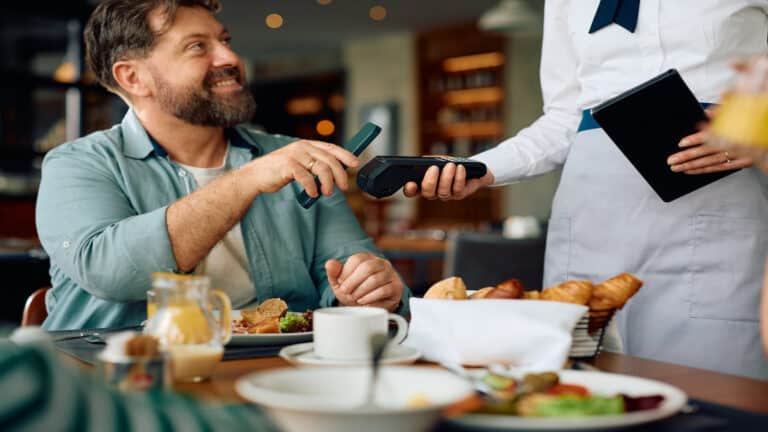13 American Customs That Make No Sense to Anyone Else

While traveling abroad, it’s easy to see and appreciate unique socials codes from around the world.
When it comes to social norms in the U.S., there are ones that Americans find typical when, in reality, they baffle the rest of the world.
These customs are famous for the average American but make little sense to anyone else.
Tipping

This big one often causes heated debates between Americans and other cultures. While it’s customary in the U.S. to tip servers at restaurants and for service workers like hairdressers and nail technicians, other countries are off board.
Foreigners are often shocked at America’s tipping culture as they’re not expected to tip.
Wearing Sweatpants in Public

The sporty casual look is a major fashion trend, so you can’t go wrong by throwing on a pair of sweatpants and a hoodie for a stylish look. In countries like Europe, wearing sweatpants in public is seen as disrespectful and is looked down upon.
Depending on where you’re traveling, you may want to consider your outfit twice before you step out the door.
Eating Somewhere That Doesn’t Serve Food

Eating a small snack on the bus might not seem like a big deal to you, but it’s considered rude in other countries.
For example, eating in public places, on trains, or while walking is looked down upon in Japan.
Baby Showers

Throwing a baby shower is a celebrated milestone for pregnancies across the U.S. Baby showers aren’t part of the culture in countries like Italy and others in Europe. Giving gifts to the baby before the birth is terrible luck.
Most people start having guests a few weeks after the baby is born, and that’s usually when they can bring a gift or two.
Asking for a Doggy Bag

Most Americans won’t think twice about asking for a doggy bag when out to eat. Since you paid for the meal, you could take the leftovers home. In several European countries, asking for a to-go box is a no-go.
Some servers may even flat-out refuse to do it and, at the least, will be surprised by your request.
Filing Taxes

If you’ve ever had to file your taxes, you know how frustrating it can be. Many people from non-U.S. countries find it baffling that Americans must file their own taxes.
It takes a few minutes and clicks in countries like New Zealand, Japan, and the Netherlands, as the government does most of the work for you.
Friendly Customer Service Workers

Super friendly customer service can be a real shock to non-Americans. You might be used to chatty and bubbly personnel, but people from other countries find this off-putting and pushy.
Some foreigners can’t fathom how overly friendly U.S. customer service workers are expected to be, especially when dealing with grumpy customers.
Being Friendly to Strangers

If you’ve ever walked past a stranger and greeted them or started small talk in an elevator — you could be judged by that outside of the U.S. Not only are friendly customer service workers off-putting to foreigners, but so is being friendly to strangers.
People from Eastern Europe might give you a weird look if you start randomly greeting them, as most don’t acknowledge or talk to strangers.
Eating Sweets Early in the Day

There’s a right time to eat sweets in the day, and Americans have it all wrong. Foreigners are baffled that in the U.S., people regularly start their days with sweets. Pancakes, french toast, pastries — all these breakfast foods aren’t typically eaten in other countries in the morning.
They prefer to save their sweets for later.
Keeping Shoes On

In America, keeping your shoes on is no big deal — we see it in movies and TV shows. However, in some cultures, leaving your shoes on while entering someone’s home, and even in some establishments, is considered ill-mannered.
Wearing your shoes on inside is considered unclean and rude, so always be mindful of other cultures and who you visit.
Ordering Water

In the U.S., Americans typically ask for free tap water with their meal when dining in restaurants. But in other countries, when dining out, you have to pay for bottled still or sparkling water.
Not Declining Gifts

Did you know it’s considered discourteous in some places not to decline a gift before accepting it?
In the U.S., saying no to a gift someone went out of their way to get for you is rude, while in countries like Japan, it’s the norm.
To not seem impolite, it’s customary for people in Japan to decline a gift at least twice before finally accepting it.
The Obsession With College Sports

It’s no secret that Americans love college sports. Thousands of spectators come to stadiums to watch college football games, volleyball matches, and more. Tailgate parties are woven into American culture, and college sports are more of a way of life than a hobby.
Countries outside the U.S. don’t get the hype and could care less about college sports programs.





